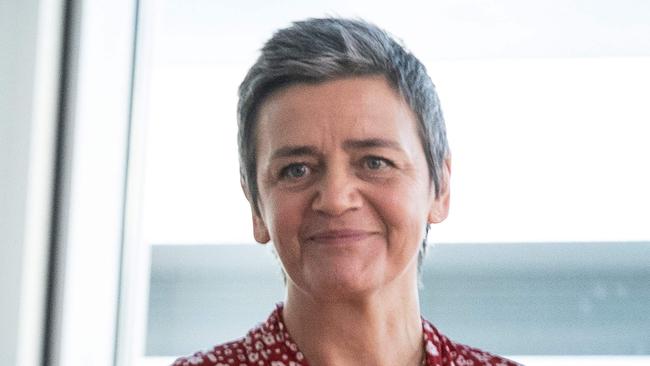Google hit for billions but EU chief regrets not going harder
A European competition chief who imposed fines of more than €8bn against Google says she should have been ‘bolder’.

A European competition chief who imposed fines of more than €8bn against Google says she should have been “bolder”, as the Morrison government moves to respond to the Australian regulator’s report into the tech titans.
Treasurer Josh Frydenberg and Communications Minister Paul Fletcher are on Thursday to announce the government’s response to the Australian Competition & Consumer Commission’s digital platforms inquiry released six months ago.
“There are privacy issues, consumer protection issues, competition issues, a lot of media policy issues, and so we are obviously working through our response on that,” Mr Fletcher said.
His comments came after European Competition Commissioner Margrethe Vestager said with hindsight she would have taken a different line with Google despite imposing massive fines after a decade-long investigation.
“If I knew then what I know now I would have been bolder,” Ms Vestager said.
The ACCC’s inquiry, led by chairman Rod Sims, examined the market power of digital platforms such as Google and Facebook and how they had affected local media companies. The final report, which has attracted international attention, proposed 23 recommendations, including the establishment of a specialist digital platforms branch within the ACCC, changes to the merger law, and advance notice of acquisitions by tech giants that might affect competition in Australia.
Mr Frydenberg, Mr Fletcher and Attorney-General Christian Porter have been managing the government’s response. Google and industry group Digi are understood to have increased lobbying in recent weeks in a bid to soften the government’s response.
It is understood the government had concerns about forcing digital giants to pay media companies for using their journalism out of fear the move could be interpreted as a new tax.
Mr Fletcher said Mr Porter was working with states and territories to address issues about defamatory content, while he was working with Families and Social Services Minister Anne Ruston to enable the Australian Communications and Media Authority to develop a website-blocking scheme involving penalties and disruption measures.
Mr Fletcher also indicated he had no plans to loosen media laws to allow for mergers in regional areas. Regional media proprietor Antony Catalano has repeatedly called on the government to change the legislation to allow him to buy other assets, such as Prime Media Group. This week plans for a merger between Prime and Seven West Media were brought to a halt after Mr Catalano and media mogul Bruce Gordon separately expressed their intention to vote against the merger.
Mr Catalano and Mr Gordon have both shown a desire to acquire Prime, but neither can under laws that require at least four media voices in a regional market. “My predecessor, Mitch Fifield, introduced some very significant changes to the Broadcasting Services Act under which it is now possible for a transaction of the kind that is proposed, namely the Seven-Prime merger, to proceed,” Mr Fletcher said. “How a particular transaction plays out … is a matter for them.”



To join the conversation, please log in. Don't have an account? Register
Join the conversation, you are commenting as Logout